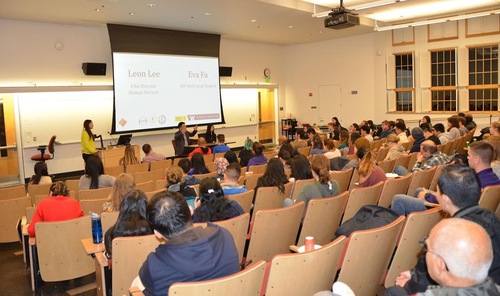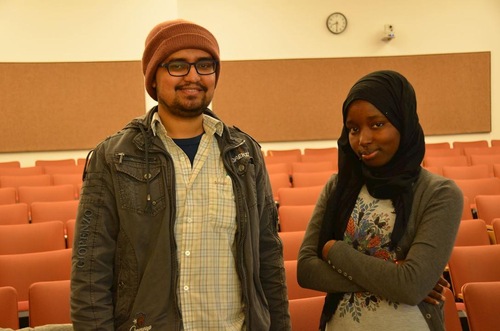(Minghui.org) A public screening of “Human Harvest,” a Peabody award-winning documentary, was held at the University of Washington in Seattle on the evening of November 9, 2017. The film covers the extrajudicial killing of Falun Gong practitioners in China for their organs as part of the communist regime’s persecution of the spiritual discipline.
 A public screening of documentary “Human Harvest” at the University of Washington in Seattle on November 9, 2017.
A public screening of documentary “Human Harvest” at the University of Washington in Seattle on November 9, 2017.
The screening was followed by a forum. The event was co-hosted by Cheryl Yu, a graduate student at the Evans School of Public Policy and Governance, and Liz Harding Chao, the co-chair of the Partnership for Community and Diversity (PCD).
The film’s director, Leon Lee, came from Vancouver to attend the event.
During the forum discussion, Eva Fu, a business student and a Falun Dafa practitioner, shared her experience of being persecuted for her faith while growing up in China.
The attendees were mostly students and professors of the University of Washington. Audience members wanted to learn more details and asked how they could help to stop the atrocity taking place in China.
Kate, a student at the university, said she had watched a movie depicting organ farming in a futuristic world. She never thought something similar could happen in the real world on such a large scale and controlled by a government.
Kate said she would promote the documentary to let more people know the ongoing crime in China. “Just like the director repeated in the Q-and-A, 'Knowledge is power',” she said.
Susan, a student who came to the screening together with Kate, said she didn't know anything about the organ harvesting crimes before the event. “I didn't expect it was so bad as it showed in the film. Everyone must watch it at least once. This is an inspiring film,” said Susan.
 Students Aung Thiha Kyaw (left) and Fatoumata Jammeh
Students Aung Thiha Kyaw (left) and Fatoumata Jammeh
Five students from Shoreline Community College were invited to the screening by a student at the University of Washington. Fatoumata Jammeh is a sophomore international studies major.
“I am happy the doctors and policemen involved had the courage to tell the world what they had seen and experienced. Also, the two ladies in Taiwan told us the stories of their family members who went to China to have organ transplants. They made the documentary more convincing,” said Fatoumata.
“It is most painful to me that they [Falun Dafa practitioners] are not criminals; they just practice 'Truthfulness-Compassion-Forbearance,' but they had their organs taken when they were conscious and alive. The communist party showed no remorse for committing this crime,” she added.
She would recommend the documentary to her friends and encourage them to attend an event like this. “We believe the world can pressure the Chinese Communist Party to stop this atrocity,” she concluded.
Aung Thiha Kyaw is a student from Burma. He said that indifference and ignorance are the biggest obstacles in letting the world know the facts. “If a person doesn't take the initiative to learn, one will never learn what happened,” said Kyaw.
One student asked to remain anonymous because she has family members in China. She was born in South Korea, lived in China for ten years, and can speak fluent Chinese.
“All the textbooks and media reports were negative about Falun Gong. Eventually, no one can tell right from wrong. Even if you know the facts, you are not allowed to speak up,” she said, “My father warned me not to talk to anyone about this topic.”
“After watching this documentary and talking to the director and other people, I felt ashamed at the ten years of living in China. If I don't do anything in a free country, I am not any different from those Chinese students.”
Category: Organ Harvesting





